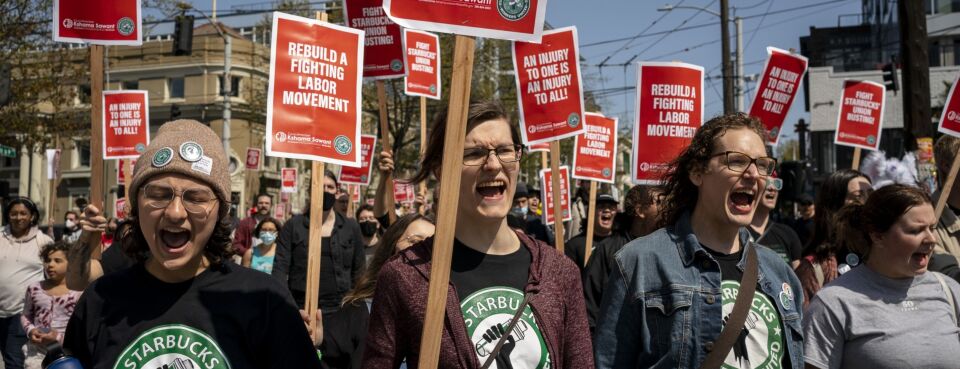
Travis Lavenski is a student at Harvard Law School.
Welcome back OnLabor readers! In today’s News & Commentary, Starbucks hit with a Board complaint for failure to negotiate with multiple stores; Trader Joe’s workers in Minneapolis walk off the job; Republicans plan to attack Congressional workers’ right to organize; and the Supreme Court is set to hear oral arguments for the important Glacier Northwest case next week.
Starbucks Coffee continues to make headlines in its response to the unionization wave that has occurred in its stores for just over a year now. The NLRB filed a complaint against the coffee giant for refusing to negotiate with 21 stores in Washington and Oregon. The complaint follows a recent Board ruling that Starbucks has failed to negotiate at a Seattle roastery location. This marks the first time the Board has filed a complaint against the store for failure to bargain with multiple locations, though similar complaints may come soon. Starbucks has racked up 50 Board complaints totaling to over 1,000 labor law violations before year’s end.
Workers at a unionized Trader Joe’s store in Minneapolis walked out on New Year’s Eve. The workers, who unionized this summer, staged a walkout after the company cut hours for union-supporting workers and increased hours for new hires. Workers also demanded the company to bargain fairly and swiftly. This Trader Joe’s location is one of two unionized stores in the country. In response to union organizing drives at multiple locations thus summer, Trader Joe’s hired notorious union-busting law firm Littler Mendelson. MorePerfectUnion released this short video last month detailing workers’ fight for a contract in the workers’ own words.
On the first day of 2023, House Republicans released a rules package for the 118th Congress which states the party’s intention to, among other things, “eliminate Democrats’ creation of House staff labor unions so that congressional staff are accountable to the elected officials they serve.” Congressional workers are not covered by the NLRA, thus only received the right to organize last year after the 117th House passed a resolution. “We organized and unionized offices in the 117th Congress, and we’re going not to stop in the 118th Congress,” the Congressional Workers United tweeted in response. “When we fight, we win, and we’re ready to take on any anti-worker battles that may come our way.” There is some question about whether the House Republicans can lawfully strip away this right through a rules package. As David Dayen of the American Prospect explained on Twitter, “last year’s House resolution on staff unions just implemented a provision of the Congressional Accountability Act of 1995. [It’s n]ot certain a rules package can take that away.”
Looking forward, the Supreme Court is set to hear oral arguments for the Glacier Northwest case on January 10. The technical question in the case is whether the NLRA preempts an employer’s state tort claim for intentional destruction of property during a labor dispute. Practically, a decision for the employer could further chill unions’ right to strike, as the threat of a lawsuit would loom after any decision to go out of strike. For a more in-depth look at the stakes of this decision, see Ben’s previous OnLabor post here.






Daily News & Commentary
Start your day with our roundup of the latest labor developments. See all
July 9
In Today’s News and Commentary, the Supreme Court green-lights mass firings of federal workers, the Agricultural Secretary suggests Medicaid recipients can replace deported farm workers, and DHS ends Temporary Protected Status for Hondurans and Nicaraguans. In an 8-1 emergency docket decision released yesterday afternoon, the Supreme Court lifted an injunction by U.S. District Judge Susan […]
July 8
In today’s news and commentary, Apple wins at the Fifth Circuit against the NLRB, Florida enacts a noncompete-friendly law, and complications with the No Tax on Tips in the Big Beautiful Bill. Apple won an appeal overturning a National Labor Relations Board (NLRB) decision that the company violated labor law by coercively questioning an employee […]
July 7
LA economy deals with fallout from ICE raids; a new appeal challenges the NCAA antitrust settlement; and the EPA places dissenting employees on leave.
July 6
Municipal workers in Philadelphia continue to strike; Zohran Mamdani collects union endorsements; UFCW grocery workers in California and Colorado reach tentative agreements.
July 4
The DOL scraps a Biden-era proposed rule to end subminimum wages for disabled workers; millions will lose access to Medicaid and SNAP due to new proof of work requirements; and states step up in the noncompete policy space.
July 3
California compromises with unions on housing; 11th Circuit rules against transgender teacher; Harvard removes hundreds from grad student union.